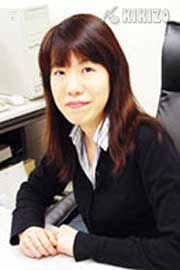Interview With Hitmaker's Mie Kumagai
The new President of Sega's Hitmaker Studio speaks about her history at the firm, and her new plans at the studio.
 |
| Kumagai: "Mr. Oguchi is a workaholic - it's in his nature." |
What are your thoughts on being named president of Hitmaker?
Kumagai: Hitmaker was originally Sega's AM3 division and became a separate company under the leadership of Hisao Oguchi. I've been responsible for scheduling and financial aspects of the company, so I think the move to president will be relatively easy. Hitmaker only had two directors so when Hisao Oguchi was named president of Sega itself, they thought I should succeed him here. Mr. Oguchi is a workaholic, it's in his nature. I think he will bring that spirit of teamwork to Sega and inspire success.
Although I've been named president, I plan to continue my duties as game producer as well. That job is very interesting, I like to think of it more as "play manager" because games don't just materialize from ideas. They must be played in order to direct development. Wearing both hats will be difficult, but I plan to continue my game director role.
What games have you worked on since you've joined Sega?
Kumagai: I hardly ever played games before I started working here. When I first joined the company, Sega was very involved in many things outside of games such as building themeparks like Tokyo Joypolis. Sega began looking toward its younger staff for producers and that's where I started at AM3 division. My first project was PowerSmash.
To develop a game you need a planner, programmer, graphic designer, sound designer, etc. I was a planner, and I thought my most important role was to view development as a player would. That way I know our audience will be satisfied. I was worried that perhaps players wouldn't like the same things I do, but I faced my amateur fears. I thought a tennis game would be great because I always see businessmen playing sports games and they're very competitive in nature.
What do you think about women being a minority group in the gaming industry?
Kumagai: I'm rarely conscious of that fact here at work. Although only 10-15 percent of our staff is female, they perform the same functions as males. They work all night sometimes, just like the guys. As a producer I was conscious of fact that some people maybe bitter about my position, but I don't think it influenced how I behaved.
I married a coworker several years ago, and this type of job lends itself to those types of relationships. You work on a game for long hours over a period of one or two years - so there are many intra-office couples. You can understand the late nights and development issues.
Do you think the number of female gamers is rising?
Kumagai: I never played games myself before joining Sega, and I think the image of a female player isn't desirable in society. But games are a great form of entertainment. I learned that at Sega and I feel women need to be educated about the fun of games. The audience for games is wide and should include more women. Darts are a more conventional game, but women really enjoy it. At a local darts bar in Ikebukuro women represent fifty percent of the cleitelle. I want to break down the barriers around videogames the same way.
Click here for more recent Sega news and interviews.





 Satoru Iwata Video Interview - the late Nintendo president spoke with Kikizo in 2004 as 'Nintendo Revolution' loomed.
Satoru Iwata Video Interview - the late Nintendo president spoke with Kikizo in 2004 as 'Nintendo Revolution' loomed. Kaz Hirai Video Interview - the first of Kikizo's interviews with the man who went on to become global head of Sony.
Kaz Hirai Video Interview - the first of Kikizo's interviews with the man who went on to become global head of Sony. Ed Fries Video Interview - one of Xbox's founders discusses an epic journey from Excel to Xbox.
Ed Fries Video Interview - one of Xbox's founders discusses an epic journey from Excel to Xbox. Yu Suzuki, the Kikizo Interview - we spend time with one of gaming's most revered creators.
Yu Suzuki, the Kikizo Interview - we spend time with one of gaming's most revered creators. Tetris - The Making of an Icon: Alexey Pajitnov and Henk Rogers reveal the fascinating story behind Tetris
Tetris - The Making of an Icon: Alexey Pajitnov and Henk Rogers reveal the fascinating story behind Tetris Rare founders, Chris and Tim Stamper - their only interview? Genuinely 'rare' sit down with founders of the legendary studio.
Rare founders, Chris and Tim Stamper - their only interview? Genuinely 'rare' sit down with founders of the legendary studio. The History of First-Person Shooters - a retrospective, from Maze War to Modern Warfare
The History of First-Person Shooters - a retrospective, from Maze War to Modern Warfare